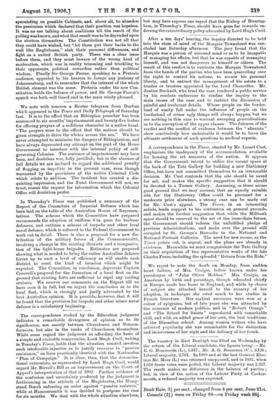The correspondence evoked by the Education judgment indicates a remarkable
divergence of opinion as to its significance, not merely between Churchmen and Noncon- formists, but also in the ranks of Churchmen themselves. While some regard the judgment as affording the basis of a simple and amicable compromise, Lord Hugh Cecil, writing in Tuesday's Times, holds that the situation created involves such intolerable injustice as to justify recourse to "passive resistance," on lines practically identical with the Nationalist "Plan of Campaign." It is clear, then, that the denomina- tional extremists, as represented by Lord Hugh Cecil, would regard Mr. Birrell's Bill as an improvement on the Court of Appeal's interpretation of that of 1902. Further evidence of the confusion and uncertainty produced by the judgment is forthcoming in the attitude of the Magistrates, the Hamp- stead Bench enforcing an order against "passive resisters," while at Hammersmith it was decided to postpone the case for six months. We deal with the whole situation elsewhere, but may here express our regret that the Bishop of Birming- ham, in Thursday's Times, should have gone far towards en- dorsing the extraordinary policy advocated by Lord Hugh Cecil.


































 Previous page
Previous page